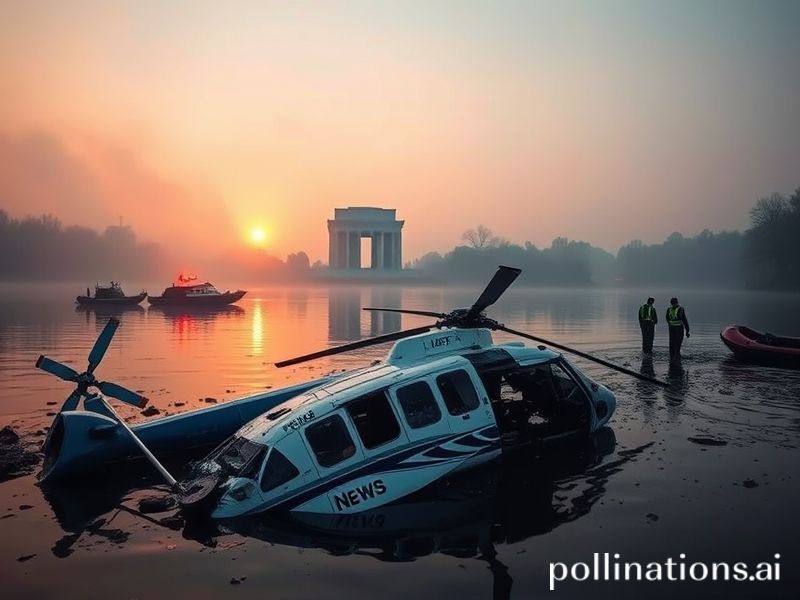Potomac Mid-Air Mayhem: Washington’s Latest Export Is Schadenfreude
Washington’s latest airborne drama unfolded with the predictability of a Swiss train and the grace of a lead balloon. A Black Hawk helicopter—officially described as “military,” though at this point everything in D.C. is either military, militarized, or under military investigation—went nose-to-nose with an American Eagle commuter jet over the Potomac River. Both lost. The wreckage now litters the river like the remnants of bipartisan cooperation, and the global commentariat has already begun its favorite pastime: nodding solemnly while secretly updating their “Which Country Looks Most Competent Today?” spreadsheets.
Cue the international reaction, that synchronized ballet of practiced concern. The French Foreign Ministry issued a statement conveying “deep sympathies,” which is diplomat-speak for “Thank heavens it wasn’t an Airbus.” Beijing offered technical assistance, a move that doubled as a subtle reminder that Chinese air-traffic control systems haven’t had a mid-air collision since, well, ever. Meanwhile, British pundits filled newspaper columns with 700-word eulogies to American decline, neatly forgetting that London City Airport is basically a game of Tetris played with gin-soaked pilots. Schadenfreude, like cheap jet fuel, remains a global commodity.
For the rest of the planet, the crash is less a singular tragedy and more a data point in the ever-expanding PowerPoint of American entropy. Foreign ministries from Canberra to Abu Dhabi have quietly added “reassess U.S. aviation safety” to their risk registers, right between “supply-chain hiccups if California falls into the sea” and “nuclear codes possibly stored on Post-it note.” If you’re a mid-level diplomat in Jakarta tasked with contingency planning, you now have to game out what happens when the country that invented air travel can’t keep its own aircraft from playing bumper cars at 2,000 feet.
The irony, of course, is rich enough to clog an artery. The United States spends more on defense than the next ten countries combined, yet it apparently can’t coordinate a chopper and a 76-seat commuter jet in its own capital. Somewhere in Moscow, an underpaid analyst just updated the “U.S. Overstretch” column with a little red star. Meanwhile, Lockheed Martin’s share price dipped only 0.3 percent, because in the great casino of geopolitics, nothing says “buy the dip” like flaming wreckage that still needs replacing at taxpayer expense.
Global airlines, ever the masters of passive-aggressive press releases, have issued “operational updates” reminding passengers that their fleets are, respectively, Airbus, Bombardier, or Embraer—code for “not the one that just lawn-darted into the Potomac.” Air France-KLM even slipped in a reference to its “European safety culture,” a phrase so smug it could ferment its own wine. Over in Dubai, Emirates issued a 14-tweet thread praising its “zero-fatalities record,” which doubles as free advertising for its in-flight shower suites. Tragedy, meet marketing synergy.
Then there’s the question of who, exactly, was aboard the helicopter. Initial reports mention “training mission,” which is Beltway argot for “we’d rather not say.” International intelligence services are already running the passenger manifest through facial-recognition databases faster than you can say “Five Eyes.” If any of the deceased held clearances above “confidential,” expect a fresh round of diplomatic déjà vu: discreet briefings, hushed corridor gossip, and the inevitable TikTok leak from a 19-year-old analyst whose password was “password123.”
The Potomac itself, usually a placid backdrop for cherry-blossom selfies, now resembles a crime-scene diorama. News choppers hover like vultures with press badges, their live feeds beamed to living rooms from Lagos to Lima, where viewers can marvel at the latest American spectacle in HD. Somewhere a Nairobi taxi driver glances at the screen, shrugs, and mutters, “At least our traffic jams stay on the ground.” The global south, long lectured on infrastructure and governance, enjoys a rare moment of smugness—tempered only by the knowledge that their own aviation regulators still run on fax machines and hope.
In the end, the crash will fade from international headlines faster than a pop star’s apology video. Investigations will be launched, findings will be partially redacted, and Congress will hold hearings that double as campaign fundraisers. The rest of the world will file the incident under “America, 2020s”—a folder already bulging with insurrections, supply-chain snarls, and the occasional airborne oopsie. Somewhere, a Swiss bureaucrat will update the Global Competitiveness Index, quietly sliding the United States down another notch while pretending it pains him to do so. And the Potomac, indifferent to human folly, will keep flowing toward the Chesapeake Bay, carrying with it the latest proof that gravity, unlike policy, remains non-negotiable.







